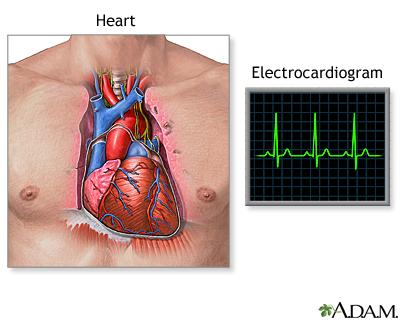Cocaine withdrawal
Definition
Cocaine withdrawal occurs when someone who has used a lot of cocaine cuts down or quits taking the drug. Symptoms of withdrawal can occur even if the user is not completely off cocaine and still has some of the drug in their blood.
Alternative Names
Withdrawal from cocaine; Substance use - cocaine withdrawal; Substance abuse - cocaine withdrawal; Drug abuse - cocaine withdrawal; Detox - cocaine
Causes
Cocaine produces a sense of euphoria (extreme mood elevation) by causing the brain to release higher than normal amounts of some chemicals. But, cocaine's effects on other parts of the body can be very serious, or even deadly.
When cocaine use is stopped or when a binge ends, a crash follows almost right away. The cocaine user has a strong craving for more cocaine during a crash. Other symptoms include fatigue, lack of pleasure, anxiety, irritability, sleepiness, and sometimes agitation or extreme suspicion or paranoia.
Cocaine withdrawal often has no visible physical symptoms, such as the vomiting and shaking that accompany withdrawal from heroin or alcohol.
Symptoms
Symptoms of cocaine withdrawal may include:
- Agitation and restless behavior
- Depressed mood
- Fatigue
- General feeling of discomfort
- Increased appetite
- Vivid and unpleasant dreams
- Slowing of activity
The craving and depression can last for months after stopping long-term heavy use. Withdrawal symptoms may also be associated with suicidal thoughts in some people.
During withdrawal, there can be powerful, intense cravings for cocaine. The "high" associated with ongoing use may become less and less pleasant. It can produce fear and extreme suspicion rather than euphoria. Even so, the cravings may remain powerful.
Exams and Tests
A physical examination and history of cocaine use are often all that is needed to diagnose this condition. However, routine testing will likely be done. It may include:
- Blood tests
- Cardiac enzymes (to look for evidence of heart damage or heart attack)
- Chest x-ray
- ECG (electrocardiogram, to measure electrical activity in the heart)
- Toxicology (poison and drug) screening
- Urinalysis
Treatment
Symptoms of withdrawal usually disappear over time. If symptoms are severe, a live-in treatment program may be recommended. There, medicines may be used to treat the symptoms. Counseling may help end the addiction. And, the person's health and safety can be monitored during recovery.
Support Groups
Resources that may help during recovery include:
- Partnership for Drug-Free-Kids -- drugfree.org
- LifeRing -- lifering.org
- SMART Recovery -- www.smartrecovery.org
A workplace employee assistance program (EAP) is also a good resource.
Outlook (Prognosis)
Cocaine addiction is difficult to treat, and relapse can occur. Treatment should start with the least restrictive option. Outpatient care is as effective as inpatient care for most people.
Withdrawal from cocaine may not be as unstable as withdrawal from alcohol. However, the withdrawal from any chronic substance use is very serious. There is a risk of suicide or overdose.
People who have cocaine withdrawal will often use alcohol, sedatives, hypnotics, or anti-anxiety medicines to treat their symptoms. Long-term use of these drugs is not recommended because it simply shifts addiction from one substance to another. Under proper medical supervision, however, short-term use of these medicines may be helpful in recovery.
Presently, there are no medicines to reduce craving, but research is taking place.
Possible Complications
Complications of cocaine withdrawal include:
- Depression
- Craving and overdose
- Suicide
When to Contact a Medical Professional
Contact your health care provider if you use cocaine and need help to stop using it.
If you or someone you know is thinking about suicide, call or text 988 or chat 988lifeline.org. You can also call 1-800-273-8255 (1-800-273-TALK). The 988 Suicide and Crisis Lifeline provides free and confidential support 24/7, anytime day or night.
You can also call 911 or the local emergency number or go to the hospital emergency room. DO NOT delay.
If someone you know has attempted suicide, call 911 or the local emergency number right away. DO NOT leave the person alone, even after you have called for help.
Prevention
Avoid cocaine use. If you use cocaine and wish to stop, talk with a provider. Also try to avoid people, places, and things you associate with the drug. If you find yourself thinking about the euphoria produced by cocaine, force yourself to think of the negative outcomes that follow its use.
Gallery

References
Beech R, Sinha R. Cocaine. In: Johnson BA, ed. Addiction Medicine: Science and Practice. 2nd ed. Philadelphia, PA: Elsevier; 2020:chap 22.
Bernstein CA, Poag M, Robinstein M, Ahn C, Maloy KF, Ying P. Substance withdrawal. In: Bernstein CA, Poag M, Robinstein M, Ahn C, Maloy KF, Ying P. On Call Psychiatry. 4th ed. Philadelphia, PA: Elsevier; 2019:chap 20.
Kowalchuk A, Reed BC. Substance use disorders. Rakel RE, Rakel DP, eds. Textbook of Family Medicine. 9th ed. Philadelphia, PA: Elsevier Saunders; 2016:chap 50.
National Institute on Drug Abuse website. What is cocaine? www.drugabuse.gov/publications/research-reports/cocaine/what-cocaine. Updated May 2016. Accessed April 22, 2021.
